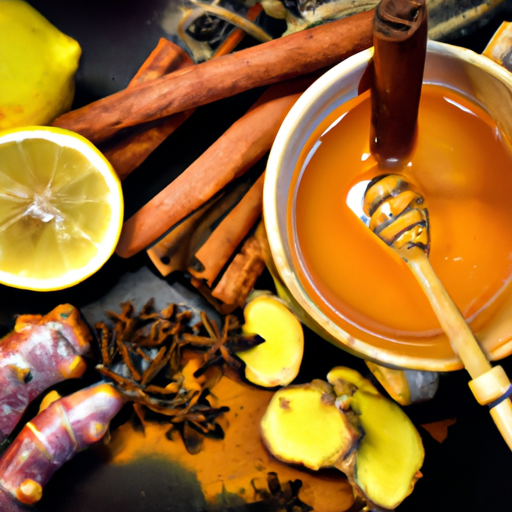As a fan of snuggling up with a hot cup of tea, I was excited to learn about the health advantages of turmeric tea. Not only does this bright yellow spice enhance the taste of my tea, but it also offers strong anti-inflammatory qualities that can aid in decreasing joint pain and enhancing immunity.
But why stop at just turmeric? After experimenting with various herbs and spices, I’ve found that adding ginger, cinnamon, lemon, honey, and black pepper can not only enhance the taste of my turmeric tea but also offer an array of health benefits.
In this article, I’ll share with you how to make a delicious cup of turmeric tea as well as tips for incorporating other healthy herbs into your brew. So grab your favorite mug and let’s get brewing!
Key Takeaways
- Turmeric tea has anti-inflammatory and antioxidant properties that can benefit overall health.
- To make turmeric tea, boil 4 cups of water and add 1 tsp dried turmeric, then strain and add honey, lemon juice, or black pepper to taste.
- Other herbs such as ginger, cinnamon, lemongrass, and cardamom can be added to enhance the health benefits of turmeric tea, but dosage and precautions should be considered and consultation with a healthcare professional is recommended.
- Adding black pepper to turmeric tea can enhance curcumin absorption and provide additional health benefits such as improving digestion and aiding in weight loss.
How to Make Turmeric Tea
Now, let’s get started on making your delicious and healthful turmeric tea! Start by boiling 4 cups of water in a pot. Add 1 teaspoon of dried turmeric to the boiling water and reduce heat to low-medium. Let it simmer for approximately 10 minutes. For a stronger flavor, you can add more turmeric powder or fresh grated turmeric root.
Once your tea is ready, strain it through a fine-mesh sieve into your cup or mug. You can add honey, lemon juice, or black pepper to taste if desired. Turmeric tea can be consumed at any time of day but is especially beneficial when consumed first thing in the morning or before bed.
Variations to try include adding cinnamon for extra anti-inflammatory benefits or using coconut milk instead of water for a creamy texture.
Now that you know how to make turmeric tea, let’s talk about the benefits of adding ginger.
The Benefits of Adding Ginger
Adding ginger to your warm, golden elixir will infuse it with a zesty flavor and provide a boost of anti-inflammatory properties. Ginger tea is a popular remedy for nausea, digestive issues, and inflammation. Here are some of the health benefits of ginger that make it an excellent addition to your turmeric tea:
-
Reduces inflammation: Ginger contains compounds called gingerols and shgaols that have potent anti-inflammatory effects. These compounds may help reduce pain and swelling in conditions such as osteoarthritis.
-
Aids digestion: Ginger has been used for centuries to relieve digestive problems such as bloating, gas, and constipation. It helps stimulate the production of digestive juices and enzymes that break down food more efficiently.
-
Boosts immunity: The antioxidants in ginger can help strengthen the immune system, making it better equipped to fight off infections.
As you can see, adding ginger to your turmeric tea not only enhances its flavor but also provides numerous health benefits. Next up, let’s explore the benefits of adding cinnamon.
The Benefits of Adding Cinnamon
To truly enhance your experience, you’ll want to consider including cinnamon in your golden elixir. Not only does the cinnamon pairing add a spicy-sweet taste to the tea, but it also has numerous health benefits.
Cinnamon is known for its anti-inflammatory properties and can help regulate blood sugar levels. In fact, studies have shown that consuming cinnamon daily can lower fasting blood glucose levels in individuals with type 2 diabetes.
In addition to its anti-inflammatory properties and ability to regulate blood sugar levels, cinnamon also contains high levels of antioxidants which protect against damage from free radicals in the body. This makes it a great addition to any diet for overall health and wellness.
So be sure to sprinkle some cinnamon into your turmeric tea for an added boost of flavor and health benefits!
Adding lemon to your golden elixir not only enhances its taste but also adds even more health benefits. Lemon is known for its high vitamin C content which supports immune function and skin health. It also aids digestion by stimulating stomach acid production and helping flush out toxins from the body.
So go ahead and squeeze some fresh lemon juice into your turmeric tea for a refreshing twist on this already amazing drink!
The Benefits of Adding Lemon
Lemon is a citrus fruit that not only enhances the taste of the golden elixir but also provides numerous health benefits when added to turmeric tea. Lemon contains high levels of vitamin C, which helps boost the immune system and fight off infections. In addition, lemon has anti-inflammatory properties that can help reduce inflammation in the body.
When combined with turmeric, lemon’s benefits are amplified. Turmeric is known for its anti-inflammatory and antioxidant properties, making it a powerful tool for fighting chronic diseases such as cancer and heart disease. Adding lemon to turmeric tea can increase its bioavailability, allowing your body to better absorb all of the beneficial compounds found in both ingredients.
Moving on to the next section about ‘the benefits of adding honey’, it’s important to note that honey also has its own set of unique health benefits when added to turmeric tea.
The Benefits of Adding Honey
I love adding honey to my turmeric tea because it not only sweetens the drink, but it also provides a variety of health benefits.
One of the most notable benefits is its ability to soothe a sore throat due to its antibacterial properties.
Additionally, honey contains antioxidants that can help protect against cell damage and reduce inflammation in the body, making it a natural choice for those looking to boost their overall health.
Soothing a Sore Throat
If you’re feeling under the weather and your throat is bothering you, adding a pinch of ginger to your turmeric tea could help ease the soreness. My friend tried this method when she had a cold and noticed improvement in her throat within a few days.
Ginger has natural anti-inflammatory properties that can soothe an irritated throat and reduce swelling. It also helps stimulate circulation, which may facilitate healing. To make ginger-turmeric tea, start by boiling water and adding freshly grated ginger root and turmeric powder. Let it simmer for a few minutes before straining out the solids.
You can add honey or lemon for taste, but avoid using too much honey as it may coat your throat and exacerbate the irritation. Instead of honey, try using licorice root or marshmallow root, both of which are known for their demulcent (soothing) effects on mucous membranes. Speaking of natural remedies and herbal infusions, another great reason to drink turmeric tea is its antioxidant properties.
Antioxidants are substances that protect our cells from damage caused by free radicals (unstable molecules) that can lead to inflammation, aging, and disease. Turmeric contains compounds called curcuminoids which have potent antioxidant effects that may benefit our overall health. So not only does drinking turmeric tea with added herbs like ginger offer relief for sore throats, it also provides a host of other health benefits!
Antioxidant Properties
I hope you found the previous section helpful in easing your sore throat. Now, let’s talk about the benefits of turmeric tea beyond just soothing a sore throat.
Turmeric is known for its antioxidant properties, which means it can help protect our cells from damage caused by harmful molecules called free radicals. Free radicals can contribute to aging and diseases such as cancer, Alzheimer’s disease, and heart disease.
Turmeric supplements are widely available, but incorporating turmeric into your cooking or drinking turmeric tea is a simple and delicious way to reap its benefits. To make turmeric tea, simply add one teaspoon of ground turmeric to boiling water and let it simmer for 10 minutes before straining. You can also add other healthy herbs such as ginger or cinnamon for added flavor and health benefits.
Moving on to the next section, if you’re looking for a natural sweetener to add to your turmeric tea or other beverages, there are plenty of options available.
Natural Sweetener
Looking for a natural sweetener to add to your turmeric tea? Look no further than honey or maple syrup! Not only do these natural sweeteners provide a delicious taste to your tea, but they also offer numerous health benefits.
Unlike processed sugar, which is linked to various health issues such as obesity and diabetes, honey and maple syrup are healthy alternatives that won’t spike your blood sugar levels. Honey has antibacterial properties and can soothe sore throats, making it a great addition when you’re feeling under the weather.
Maple syrup contains antioxidants and anti-inflammatory compounds that can help reduce inflammation in the body. So next time you make yourself a cup of turmeric tea, try adding some natural sweetness with honey or maple syrup instead of processed sugar.
Adding black pepper to your turmeric tea may seem like an unusual combination, but it’s actually beneficial for maximizing the absorption of curcumin (the active ingredient in turmeric). The piperine compound found in black pepper enhances the bioavailability of curcumin by up to 2000%.
So not only will you be enjoying a delicious cup of turmeric tea with natural sweeteners, but you’ll also be optimizing its health benefits by adding black pepper.
The Benefits of Adding Black Pepper
Wow, adding black pepper to your turmeric tea is a total game-changer! Not only does it enhance the flavor profile, but it also improves the absorption of curcumin, the active ingredient in turmeric responsible for its powerful anti-inflammatory and antioxidant properties.
This is because black pepper contains piperine, a compound that increases the bioavailability of curcumin by up to 2000%. In addition to improving curcumin absorption, black pepper also has its own impressive health benefits when consumed in moderation.
It’s been shown to have antibacterial and antimicrobial properties, improve digestion and reduce bloating, and even aid in weight loss. Incorporating a few cracks of black pepper into your daily cup of turmeric tea is an easy way to reap these benefits while also elevating the taste experience.
When considering other herbs to add to your turmeric tea repertoire, there are several options that complement both the flavor and health benefits of turmeric and black pepper.
Other Herbs to Consider
Adding a variety of complementary herbs to your turmeric and black pepper tea can add depth to both the flavor and health benefits. One great herb combination to try is ginger and cinnamon. Ginger has anti-inflammatory properties that can help reduce pain, while cinnamon may help improve blood sugar control in people with diabetes.
Another great option is lemongrass and cardamom. Lemongrass has been shown to have antioxidant effects, while cardamom may help improve digestion.
It’s important to note that when combining herbs, it’s essential to research potential interactions or consult with a healthcare professional if you’re taking any medications. Additionally, some herbs may not be safe for pregnant or breastfeeding women or individuals with certain medical conditions.
With these precautions in mind, incorporating different herb combinations into your turmeric tea can be an excellent way to maximize its health benefits while adding delicious flavors.
Precautions and Considerations
It’s important to take precautions when adding other herbs to your turmeric tea. While many healthy herbs can complement the benefits of turmeric, some may not be safe for certain individuals or may interact negatively with medications. It’s best to consult with a healthcare professional before incorporating different herb combinations into your tea.
In addition to consulting with a healthcare professional, pay attention to dosage when adding other herbs to your turmeric tea. Some herbs may have strong effects at high doses, while others may have no effect at all if not taken in sufficient amounts. Start with small amounts of any new herb and gradually increase the dose over time, paying close attention to how your body responds.
By taking these precautions and carefully considering dosage, you can make a delicious and healthful cup of turmeric tea that supports overall wellness.
Frequently Asked Questions
Can turmeric tea be used as a substitute for medication?
Using turmeric tea as a substitute for medication is like using a band-aid on a deep cut. While natural remedies and alternative medicine can be helpful, it’s important to consult with a healthcare professional for proper treatment.
Is it safe to consume turmeric tea during pregnancy?
When pregnant, it’s important to consider the benefits and risks of consuming turmeric tea. While it may provide anti-inflammatory and antioxidant benefits, high doses could be harmful. Consult your healthcare provider before adding this to your diet.
Can turmeric tea help with weight loss?
Turmeric tea has been shown to aid in weight loss by improving digestion and reducing inflammation. There are various turmeric tea recipes that can be easily made at home to reap the benefits.
What is the recommended daily intake of turmeric tea?
The recommended daily intake of turmeric tea varies based on individual needs and health conditions. The benefits of turmeric tea include reducing inflammation, improving digestion, and boosting immunity. Different variations of turmeric tea recipes can be found online or in recipe books.
Are there any potential side effects of consuming too much turmeric tea?
Consuming too much turmeric tea may cause gastrointestinal issues, low blood sugar, and allergic reactions. However, when consumed in moderation, turmeric tea benefits include reducing inflammation, improving brain function, and promoting heart health. There are many turmeric tea recipes available online for easy preparation.
Conclusion
In conclusion, incorporating turmeric tea into my daily routine has been a game changer for my overall health and well-being. I’ve found that adding other healthy herbs such as ginger, cinnamon, lemon, honey, and black pepper has only enhanced the benefits of this golden elixir.
While it’s important to note that these herbs shouldn’t replace medical treatment or advice from a healthcare professional, they can certainly supplement a healthy lifestyle. By sipping on this warm and comforting beverage, I feel nourished both physically and emotionally.
So why not give it a try? Your body (and taste buds) will thank you in ways you never thought possible.










